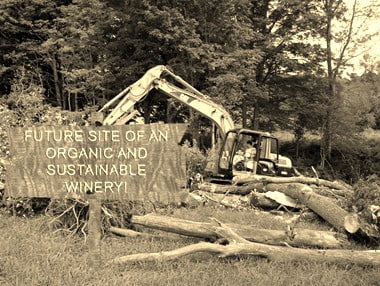
I know there’s a lot of confusion surrounding exactly what constitutes an organic wine. Most people probably think they have a fair understanding of what it means to be organic, but in actuality its more complex than you would think!
As you no-doubt already know, the growing of grapes is organic by design, but somewhere along the way wineries/grape growers lost their way. Of course you can’t tar all wineries with the same brush, and I’m also very quick to come to the defense of wineries who use “non-organic” practices. For the most part,I strongly believe that it’s consumers who have forced them into the position of using most of the methods that they do.
Wineries are actually quite “lucky” in the that they have more-or-less been granted a “zero transparency clause” and don’t have to list all the ingredients they’re using on their back label (unlike foods). Sulfur dioxide (A.K.A. sulfites) are the one exception.
“Wineries use ingredients!?!?” you say. Oh yes! They do indeed! It’s not a tangent I want to get off on here, I’ll save that for another time…but yes, there are plenty of ingredients in an “average” bottle of vino.
Lets get some organic wine questions answered!
So what are organic wines?
In order for a bottle to be labeled “organic,” it must be made from organically grown grapes. That’s not rocket science. The key thing to know about wines with a “organic” label is that they’re not allowed to include any added sulfites. That doesn’t mean that they don’t contain sulfites, they most certainly will contain a certain amount of naturally occurring sulfites, but the winemaker isn’t allowed to add them. So long as the wine contains sulfites levels no greater than 20 parts per million they’re good to go! I’ve said it before (but it’s always worth repeating): Sulfites do not cause the famous “red-wine headache!”
Are all organic wines created equally?
Not exactly. There is a second tier that is labeled “Made with Organic Grapes” or “Made with Organically Grown Grapes.” This category still requires the grapes to be organic; however, the winemaker is allowed to add sulfites.
That’s all fairly easy to understand so far, right? Well, not so fast! Different countries have their own rules and regs so far as what constitutes an organic wine, and so what is organic in one country won’t always be organic in another.
Why do wineries even use sulfites?
The use of sulfites is to help stabilize a wine. Sulfur dioxide (sulfites) are added to prevent oxidation of a wine or any additional microbial growth. Also, in sweet wines it helps to make sure that the wine doesn’t re-ferment in the bottle.
What must a winery do to be organic?
At the most basic understanding of the term, organic wine is made from grapes that have been grown without the use of synthetic chemical fertilizers, herbicides, pesticides, insecticides, fungicides. Techniques used as part of the winemaking process must also be organic.
Are all organic wineries sustainable?
Not necessarily, but it’s fair to say that if a winery is going to all the trouble of seeking (and paying for) organic accreditation, they will most likely take the ecology of the vineyard into account and employ sustainable agricultural practices.
Does it mean a winery who doesn’t label their bottles as organic is not an organic winery?
Nope! A HUGE number of wineries are making their wines organically, but don’t want to go through all the red tap and registration costs associated with being an accredited winery.
The famous Chateau de Beaucastel estate in the Rhone Valley region of France is one of the best examples, having farmed their vineyards organically since 1950.
No doubt a great number of wineries will also disagree with the government/accrediting body’s standards. Sometimes it can also be a marketing decision, as I’ve personally read a couple of studies that indicate organic wines don’t necessarily get the edge in the marketplace over non-organic wines, and sometimes can even be viewed negatively.
So what are the health benefits of drinking organic wine?
That’s a difficult one to answer. There are no long-term studies on the health benefits associated with drinking purely organic wines. My take on it is that of-course it would make sense that organic wines would be marginally healthier for you than “regular” wines. The main problem with drinking only organic wines is that you’re heavily limiting your “wine reach,” since so few wineries are fully-organic. The people who are genuinely allergic to sulphur dioxide are the ones who should obviously skew towards organic/sulfite-free wines.
The main reason for choosing organic wines are the environmental benefits i.e. the vineyard isn’t letting chemicals run-off into nearby rivers, the long-term integrity of the soil isn’t compromised, chemicals don’t harm/kill vineyard-dwelling animals etc.
Then, just to REALLY confuse things, there’s Biodynamic wines!
Quite unbelievably, Biodynamic winemaking came long before the growth of the organic movement.
The biodynamic process was created by a crazy Austrian named Rudolph Steiner in 1924. In order for a vineyard to be considered “Biodynamic,” they must be fully organic and then on top of that adhere to nine rather weird (for want of a better word) preparations. Here are two of them (and I PROMISE these are real! I’m not making either of these up!):
 – Cow horns filled with cow manure are planted in the vineyard throughout the winter, and then dug back up, dropped into a bucket of water and then that water is to be sprayed on the soil.
– Cow horns filled with cow manure are planted in the vineyard throughout the winter, and then dug back up, dropped into a bucket of water and then that water is to be sprayed on the soil.
– The abdominal cavity membrane of a cow is filled with dandelion flowers and then hung in the sun throughout the summer. It’s then buried over the winter months, unearthed the following spring, mixed into the compost and scattered over the vineyard.
Obviously Biodynamic viticulture SUCKS if you’re a cow!
Some of the more famous biodynamic wineries include: Quintessa in Napa, Chapoutier in the Rhone, Domaine Zind-Humbrecht in Alsace, Quivira in Sonoma, Cayuse Vineyards in Washington and San Giuseppe in Tuscany.

Virginie Saverys
This is a nicely written article. Thanks for posting it, and helping explain some of the benefits of being organic. You gave short shrift to biodynamics, though. Although a lot of it sounds barmy there are key long-term benefits: the 500P helps the root system grow strong, the earth itself (in a very tangible form) smells better and looks healthier… Of course it IS almost impossible for mid-size to large wineries to be completely biodynamic; so we at Avignonesi embrace some biodynamic practices (better than none) and are well on our way to receiving organic accreditation.
Cosmo
With regards to biodynamic preps, the cow has to be, er, dead before you make the preps so it doesn’t suffer unnecessarily. To the contrary, only organic or biodynamic cows which have had a nice life are used. All those parts you mention normally go straight into an offal pit as they have no commercial use. BD practitioners also want cows with horns, not cows that have had their horns burnt off with caustic soda while they were still calves which is the “normal” practice for most cows. So BD uses the parts that are normally discarded as waste to enrich the vineyard microflora and fauna… sounds like a winner to me.
Kris Chislett
Cheers for the clarification! :) Hopefully it will go part of the way towards keeping the “carrot munchers” happy.
Kris Chislett
I only decided to to even bring up Biodynamics at the last minute, and I could certainly put more time into a more detailed article in the future.
Great news to hear about your organic accreditation!